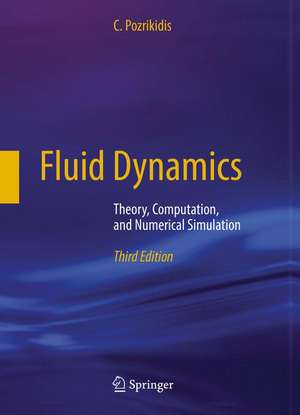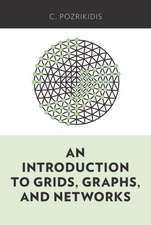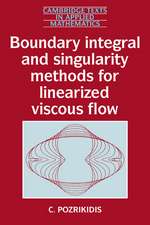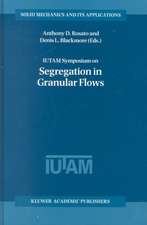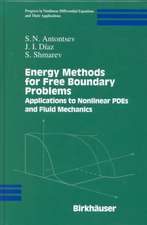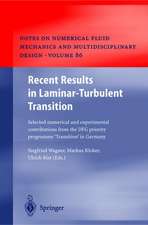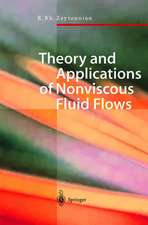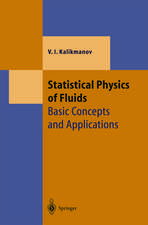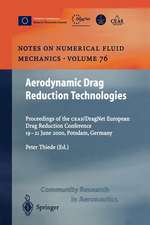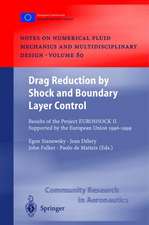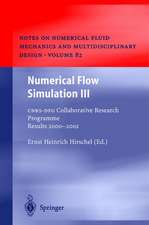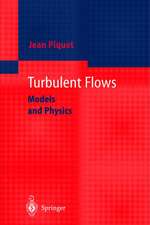Fluid Dynamics: Theory, Computation, and Numerical Simulation
Autor C. Pozrikidisen Limba Engleză Hardback – 23 aug 2016
This
book
provides
an
accessible
introduction
to
the
basic
theory
of
fluid
mechanics
and
computational
fluid
dynamics
(CFD)
from
a
modern
perspective
that
unifies
theory
and
numerical
computation.
Methods
of
scientific
computing
are
introduced
alongside
with
theoretical
analysis
and
MATLAB®
codes
are
presented
and
discussed
for
a
broad
range
of
topics:
from
interfacial
shapes
in
hydrostatics,
to
vortex
dynamics,
to
viscous
flow,
to
turbulent
flow,
to
panel
methods
for
flow
past
airfoils.
The
third
edition
includes
new
topics,
additional
examples,
solved
and
unsolved
problems,
and
revised
images.
It
adds
more
computational
algorithms
and
MATLAB
programs.
It
also
incorporates
discussion
of
the
latest
version
of
the
fluid
dynamics
software
library
FDLIB,
which
is
freely
available
online.
FDLIB
offers
an
extensive
range
of
computer
codes
that
demonstrate
the
implementation
of
elementary
and
advanced
algorithms
and
provide
an
invaluable
resource
for
research,
teaching,
classroom
instruction,
and
self-study.
This
book
is
a
must
for
students
in
all
fields
of
engineering,
computational
physics,
scientific
computing,
and
applied
mathematics.
It
can
be
used
in
both
undergraduate
and
graduate
courses
in
fluid
mechanics,
aerodynamics,
and
computational
fluid
dynamics.
The
audience
includes
not
only
advanced
undergraduate
and
entry-level
graduate
students,
but
also
a
broad
class
of
scientists
and
engineers
with
a
general
interest
in
scientific
computing.
| Toate formatele și edițiile | Preț | Express |
|---|---|---|
| Paperback (1) | 684.25 lei 38-44 zile | |
| Springer Us – 13 sep 2018 | 684.25 lei 38-44 zile | |
| Hardback (1) | 1046.00 lei 6-8 săpt. | |
| Springer Us – 23 aug 2016 | 1046.00 lei 6-8 săpt. |
Preț: 1046.00 lei
Preț vechi: 1275.61 lei
-18% Nou
Puncte Express: 1569
Preț estimativ în valută:
200.17€ • 207.80$ • 166.91£
200.17€ • 207.80$ • 166.91£
Carte tipărită la comandă
Livrare economică 22 martie-05 aprilie
Preluare comenzi: 021 569.72.76
Specificații
ISBN-13: 9781489979902
ISBN-10: 1489979905
Pagini: 949
Ilustrații: XIX, 901 p. 242 illus., 212 illus. in color.
Dimensiuni: 178 x 254 x 48 mm
Greutate: 1.77 kg
Ediția:3rd ed. 2017
Editura: Springer Us
Colecția Springer
Locul publicării:New York, NY, United States
ISBN-10: 1489979905
Pagini: 949
Ilustrații: XIX, 901 p. 242 illus., 212 illus. in color.
Dimensiuni: 178 x 254 x 48 mm
Greutate: 1.77 kg
Ediția:3rd ed. 2017
Editura: Springer Us
Colecția Springer
Locul publicării:New York, NY, United States
Cuprins
Introduction to Kinematics.- More on Kinematics.- Flow Computation based on Kinematics.- Forces and Stresses.- Hydrostatics.- Equation of Motion and Vorticity Transport.- Channel, Tube, and Film Flow.- Finite-Difference Methods.- Low-Reynolds-Number Flow.- High-Reynolds-Number Flow.- Vortex Motion.- Aerodynamics.
Recenzii
“This
text
presents
various
topics
by
providing
rigorous
theoretical
formulations,
followed
immediately
by
comprehensive
computational
and
numerical
simulation
examples.
…
this
book
is
valuable
for
graduate
level
students
focusing
on
fluid
mechanics
with
an
emphasis
on
CFD.
It
is
also
an
excellent
reference
for
practicing
scientists
and
engineers
in
a
variety
of
fields
incorporating
fluid
dynamics.
Summing
Up:
Highly
recommended.
Graduate
students,
faculty,
and
professionals.”
(B.
Tao,
Choice,
Vol.
54
(11),
July,
2017)
Notă biografică
C. Pozrikidis is a Professor at the University of Massachusetts Amherst.
His research interests span a broad spectrum of topics in Fluid Mechanics, Computational Fluid Dynamics, Applied Mathematics, Scientific Computing, Biomechanics, Bio-fluid-dynamics, Blood Flow, Computational Materials Science, and Educational Software.
He is the author of ten monographs and textbooks and several public software libraries.
Caracteristici
Offers
an
accessible
introduction
to
the
basic
theory
of
fluid
mechanics
and
computational
fluid
dynamics
for
undergraduate
and
beginning
graduate
students,
with
minimal
prerequisites
Covers a broad range of general and special topics of interest in a broad range of science and engineering disciplines
Introduces methods of scientific computing alongside theoretical analysis
Demonstrates explicitly how physical laws and equations translate into computer code
Presents and discusses MATLAB® codes for a broad range of applications
Covers a broad range of general and special topics of interest in a broad range of science and engineering disciplines
Introduces methods of scientific computing alongside theoretical analysis
Demonstrates explicitly how physical laws and equations translate into computer code
Presents and discusses MATLAB® codes for a broad range of applications
Descriere
This book provides an accessible introduction to the basic theory of fluid mechanics and computational fluid dynamics (CFD) from a modern perspective that unifies theory and numerical computation. Methods of scientific computing are introduced alongside with theoretical analysis and MATLAB® codes are presented and discussed for a broad range of topics: from interfacial shapes in hydrostatics, to vortex dynamics, to viscous flow, to turbulent flow, to panel methods for flow past airfoils.
The third edition includes new topics, additional examples, solved and unsolved problems, and revised images. It adds more computational algorithms and MATLAB programs. It also incorporates discussion of the latest version of the fluid dynamics software library FDLIB, which is freely available online. FDLIB offers an extensive range of computer codes that demonstrate the implementation of elementary and advanced algorithms and provide an invaluable resource for research, teaching, classroom instruction, and self-study.
This book is a must for students in all fields of engineering, computational physics, scientific computing, and applied mathematics. It can be used in both undergraduate and graduate courses in fluid mechanics, aerodynamics, and computational fluid dynamics. The audience includes not only advanced undergraduate and entry-level graduate students, but also a broad class of scientists and engineers with a general interest in scientific computing.
